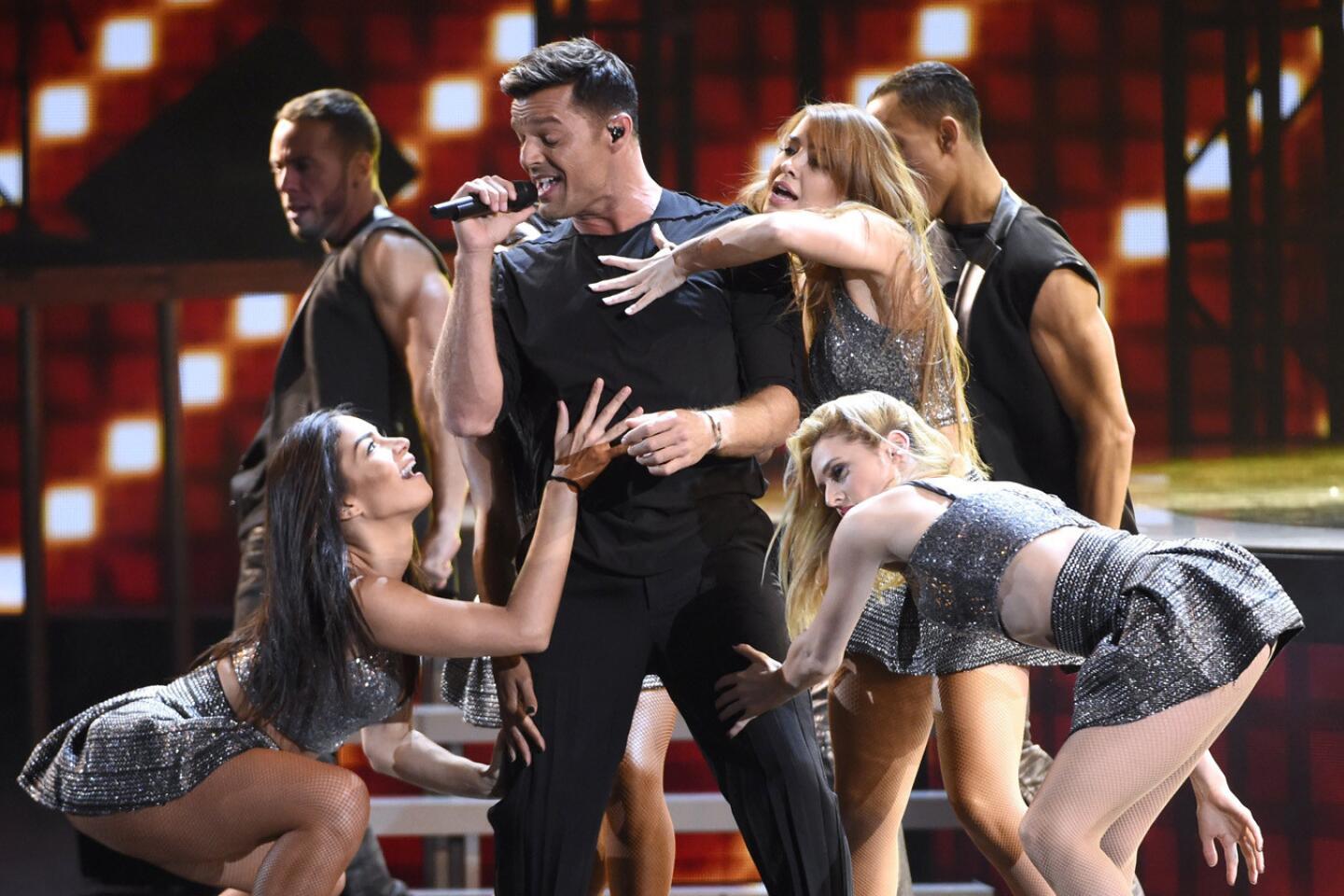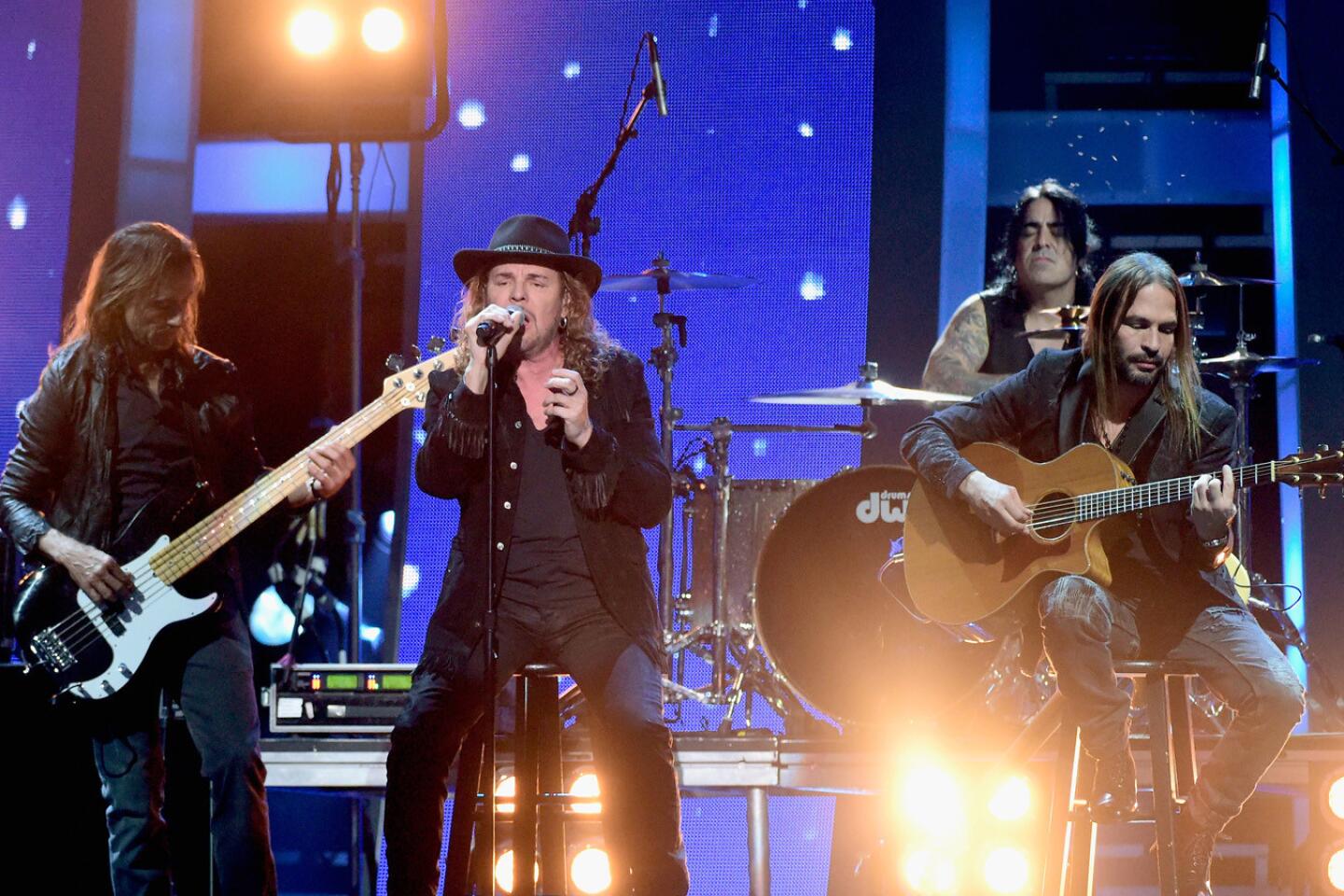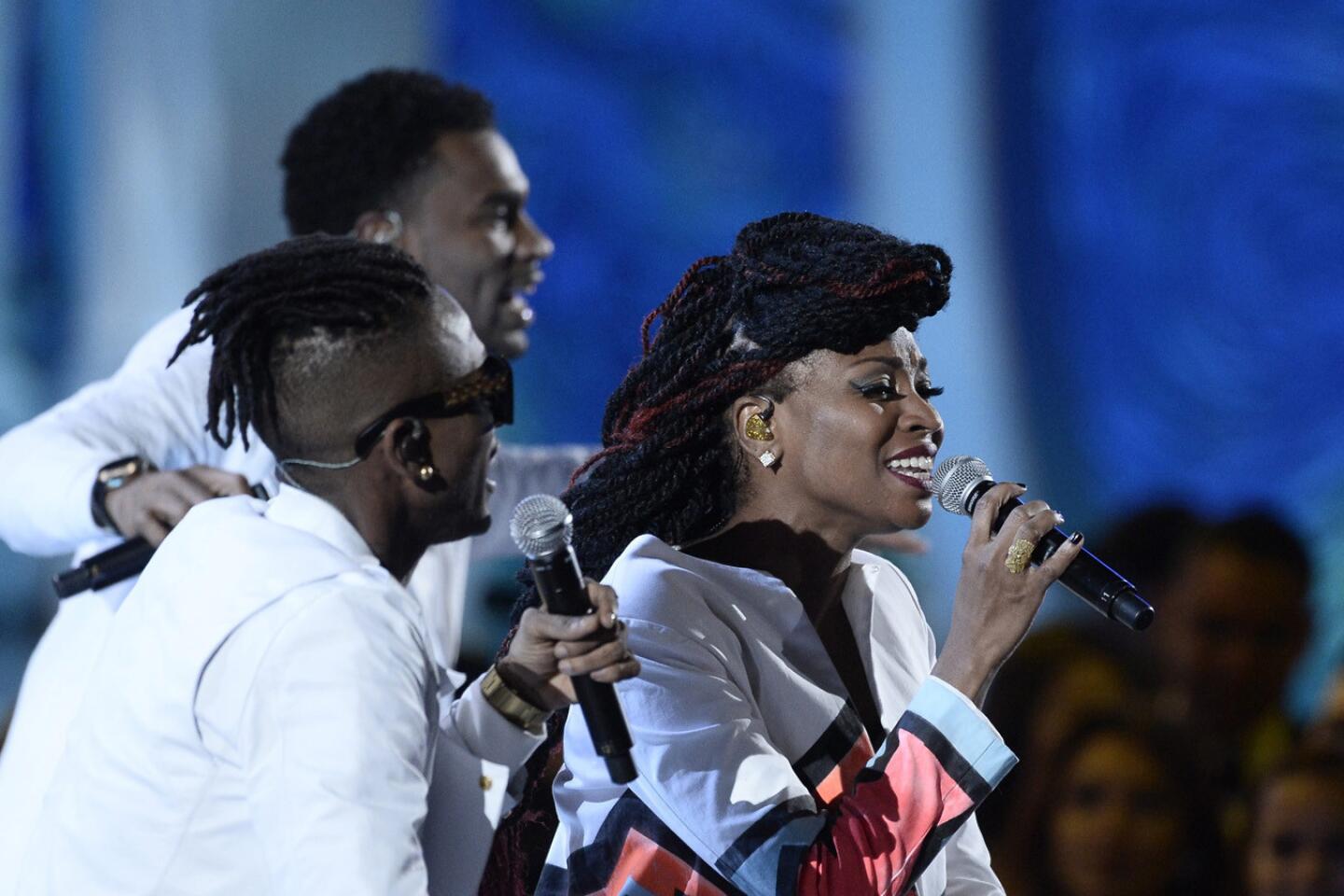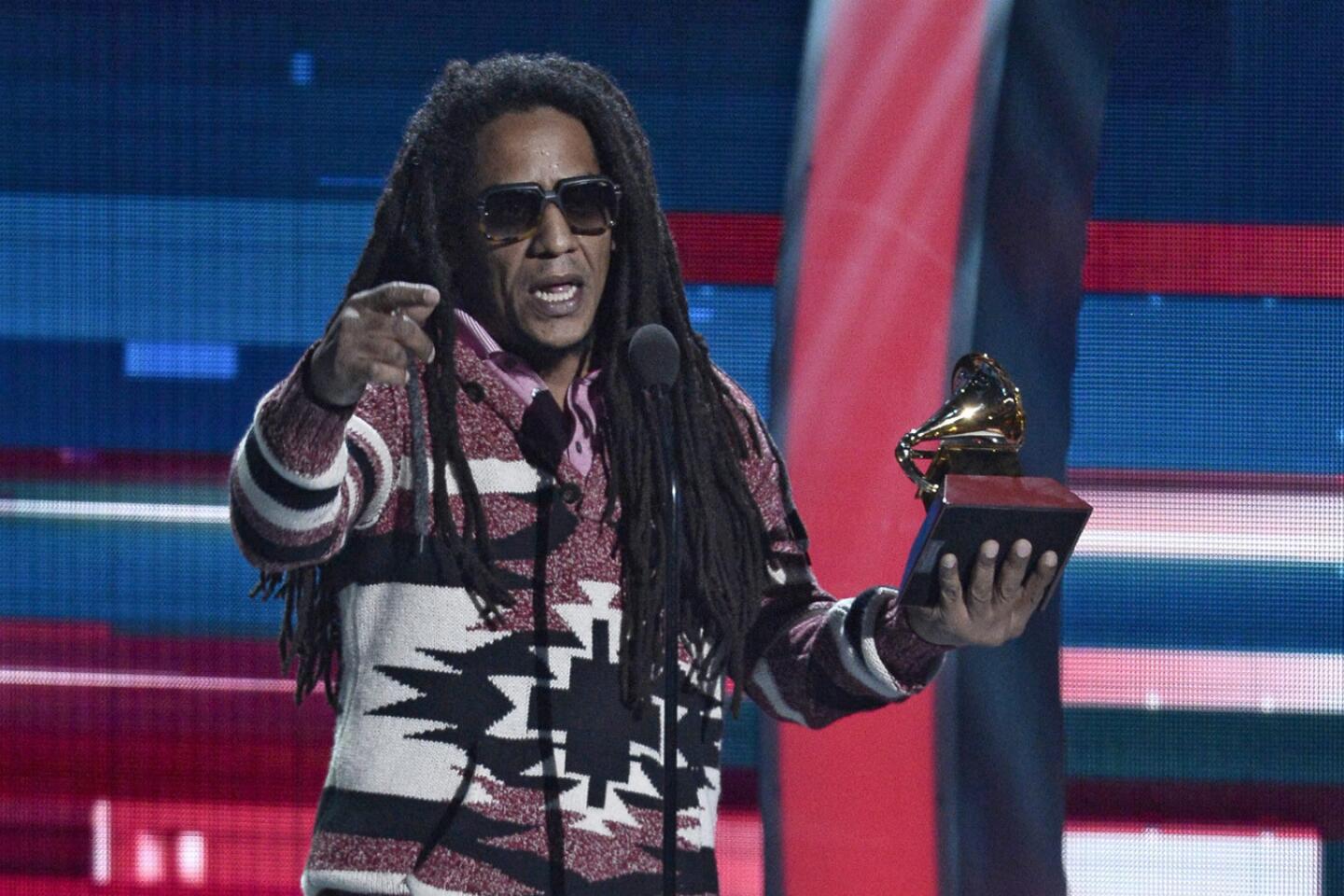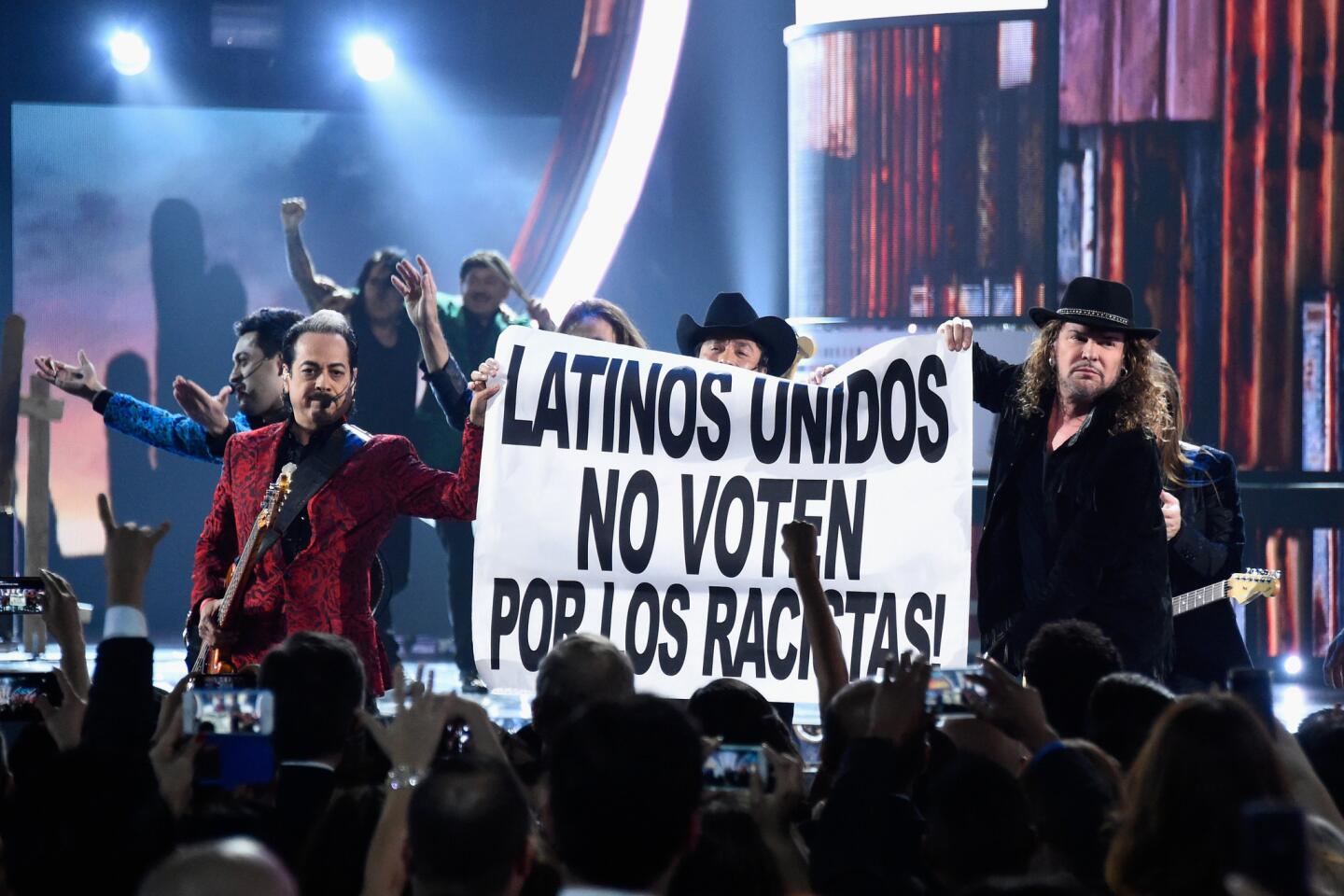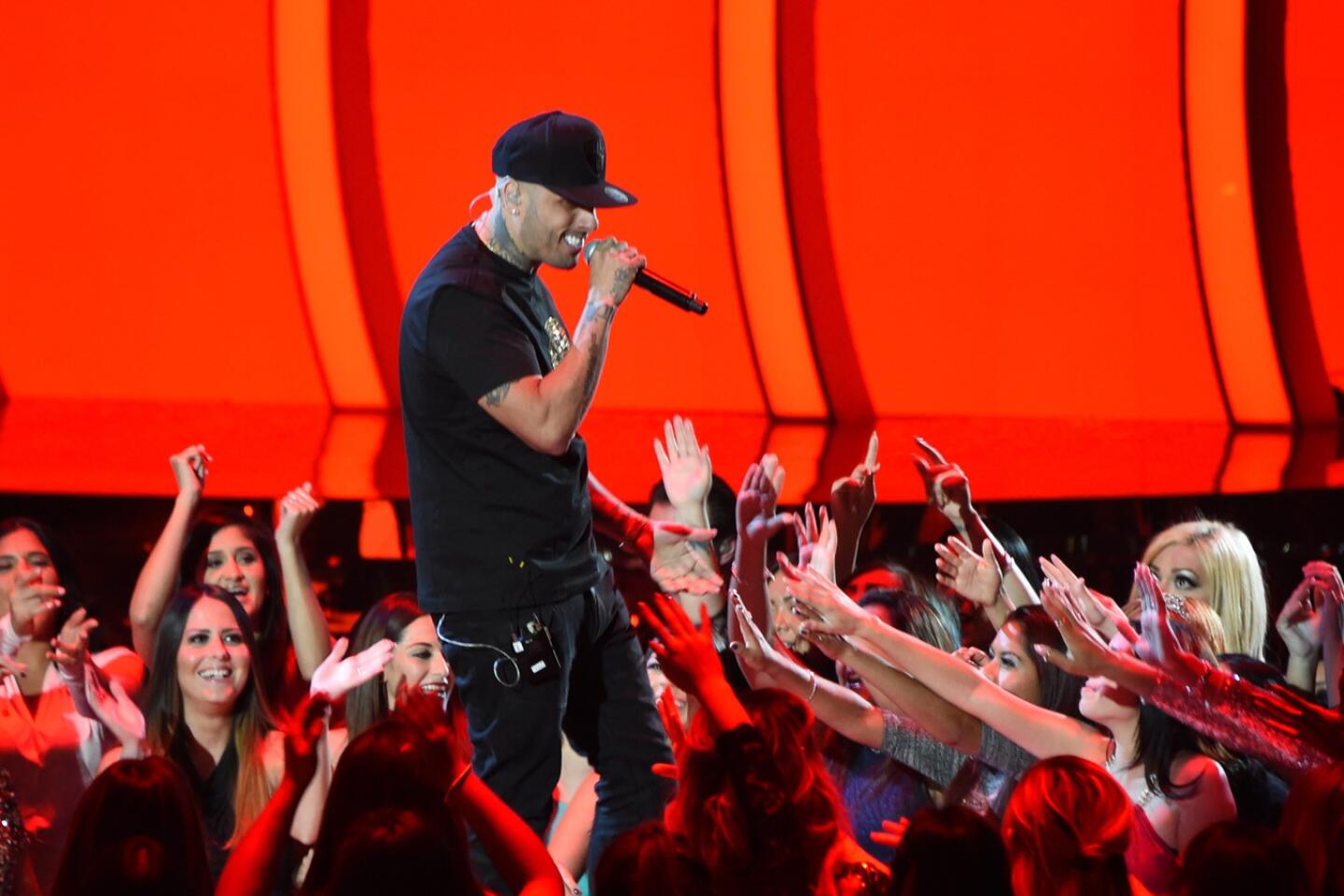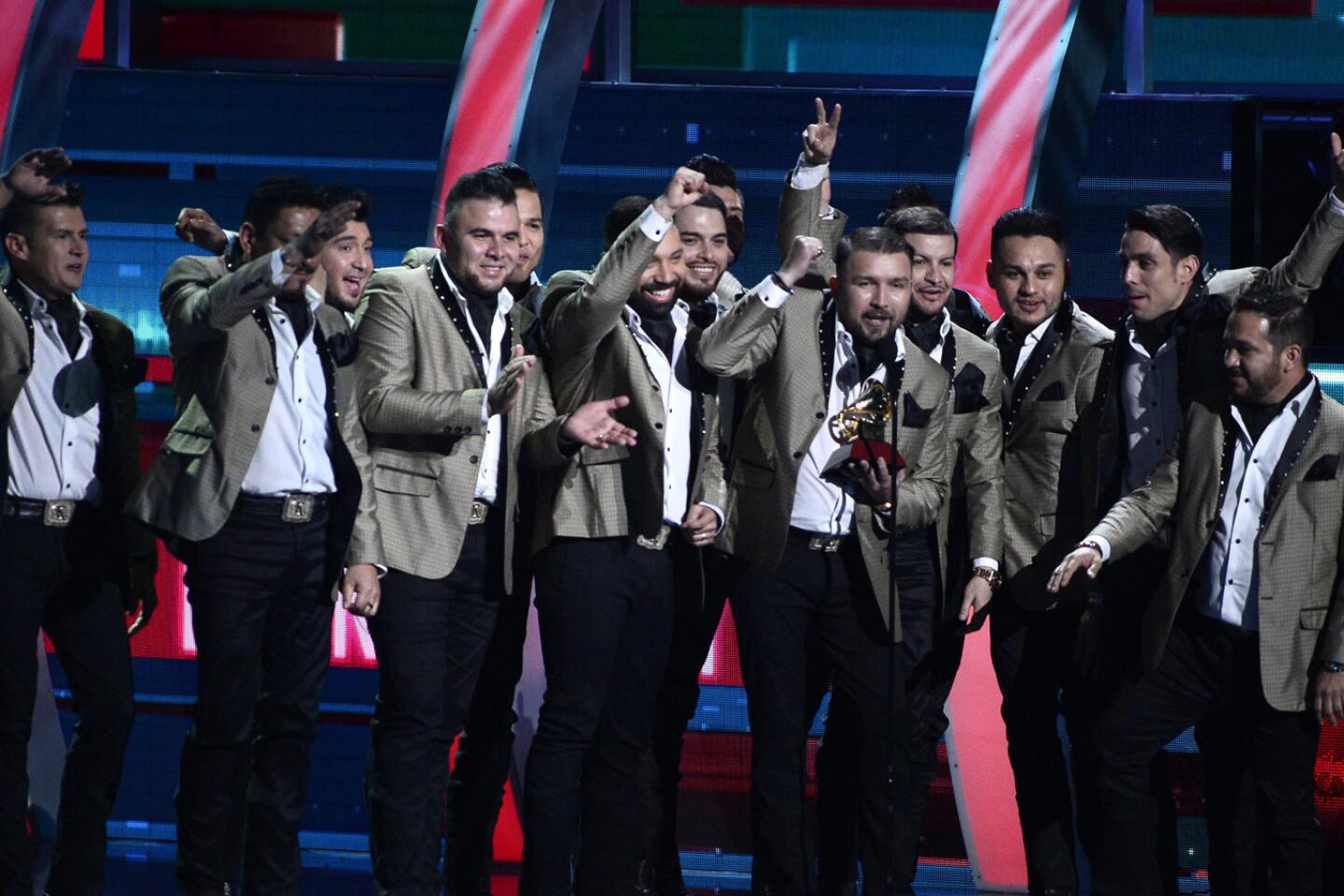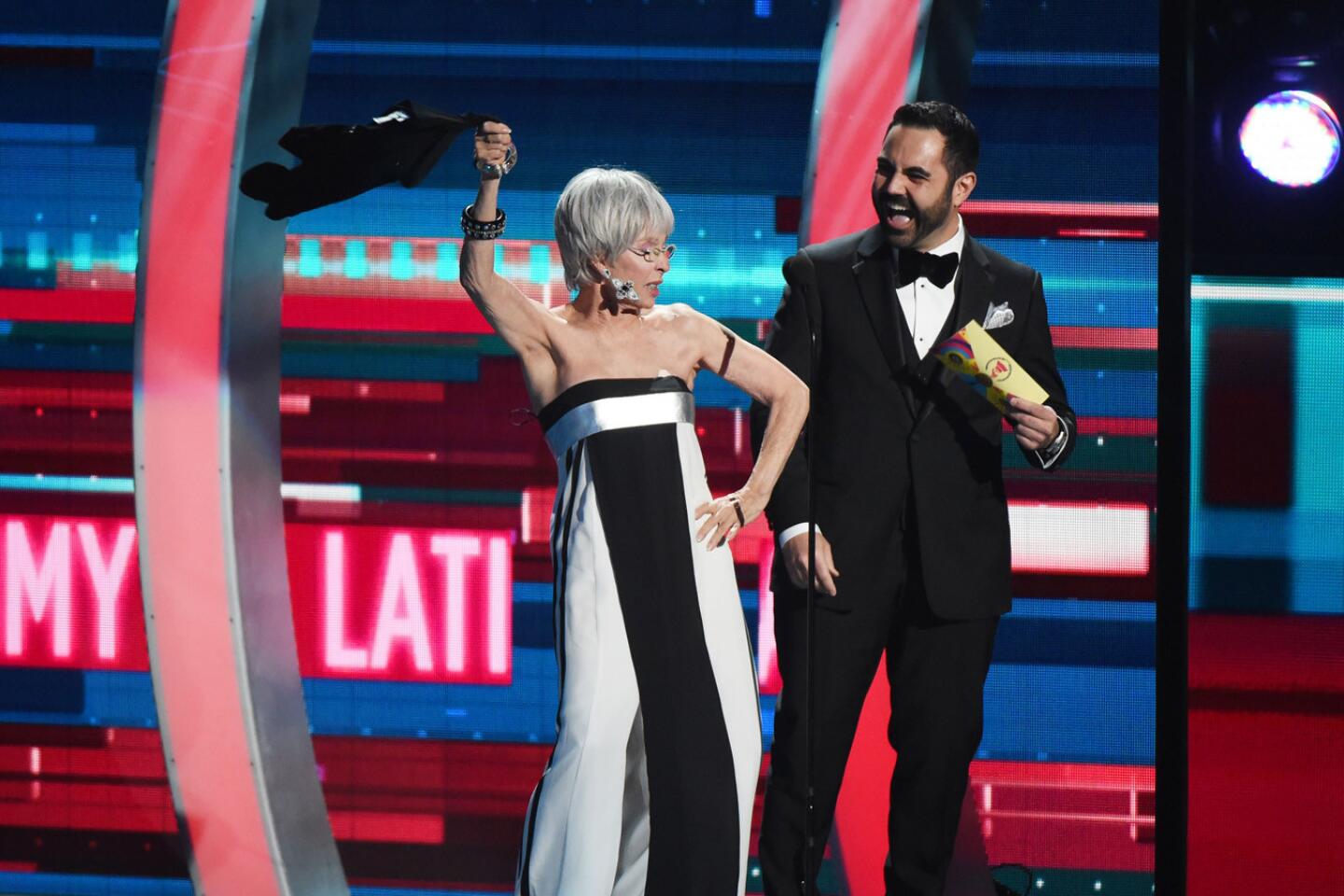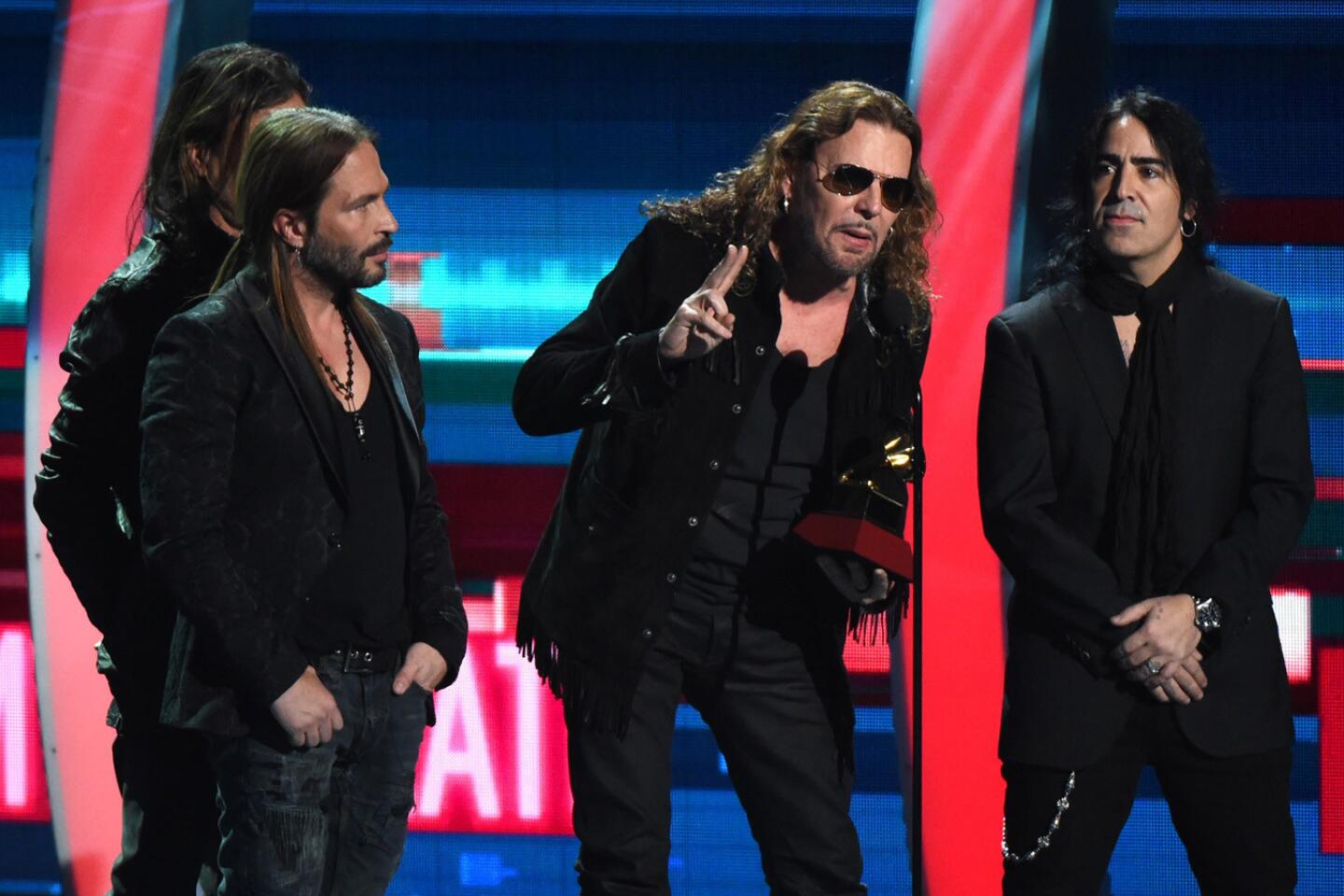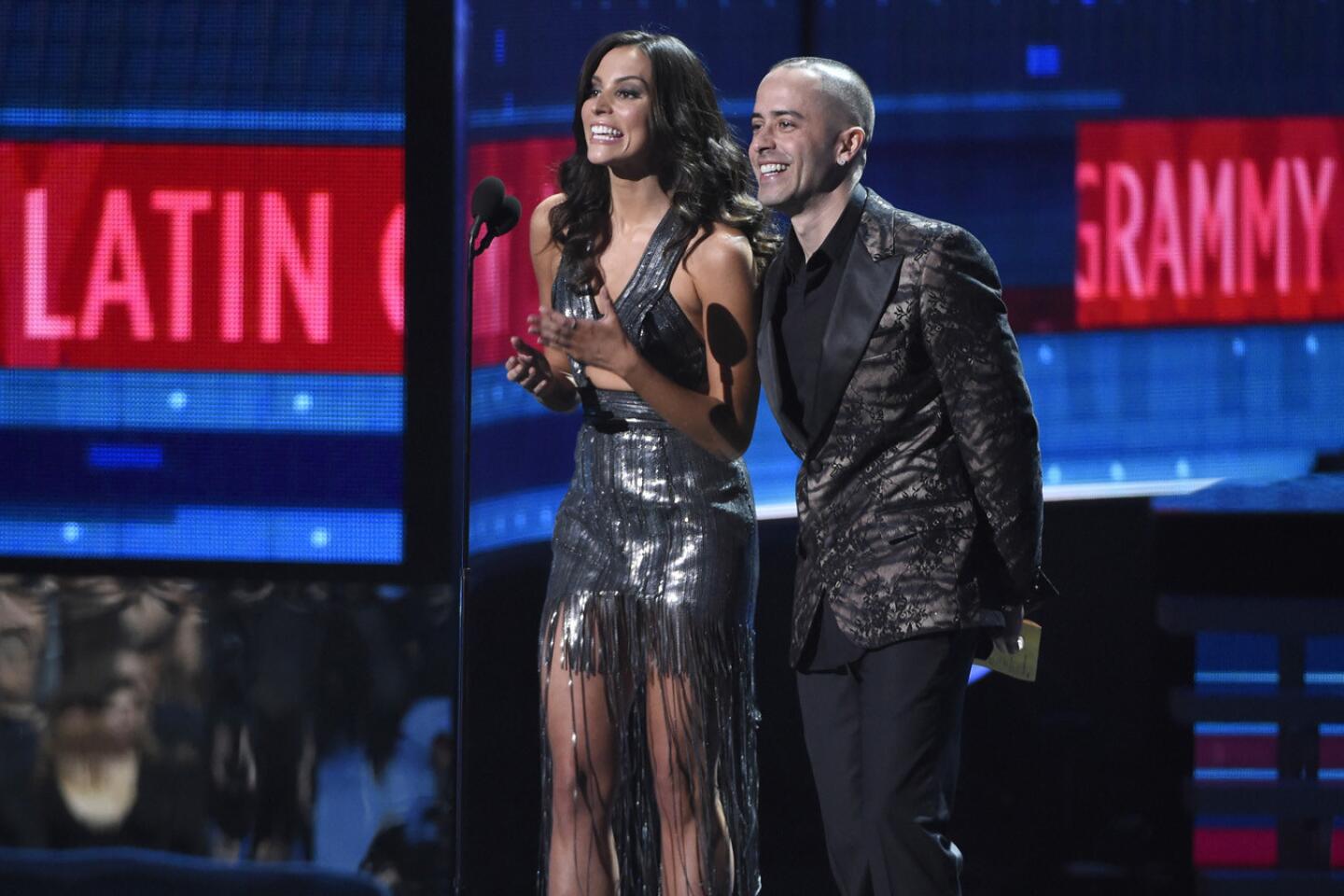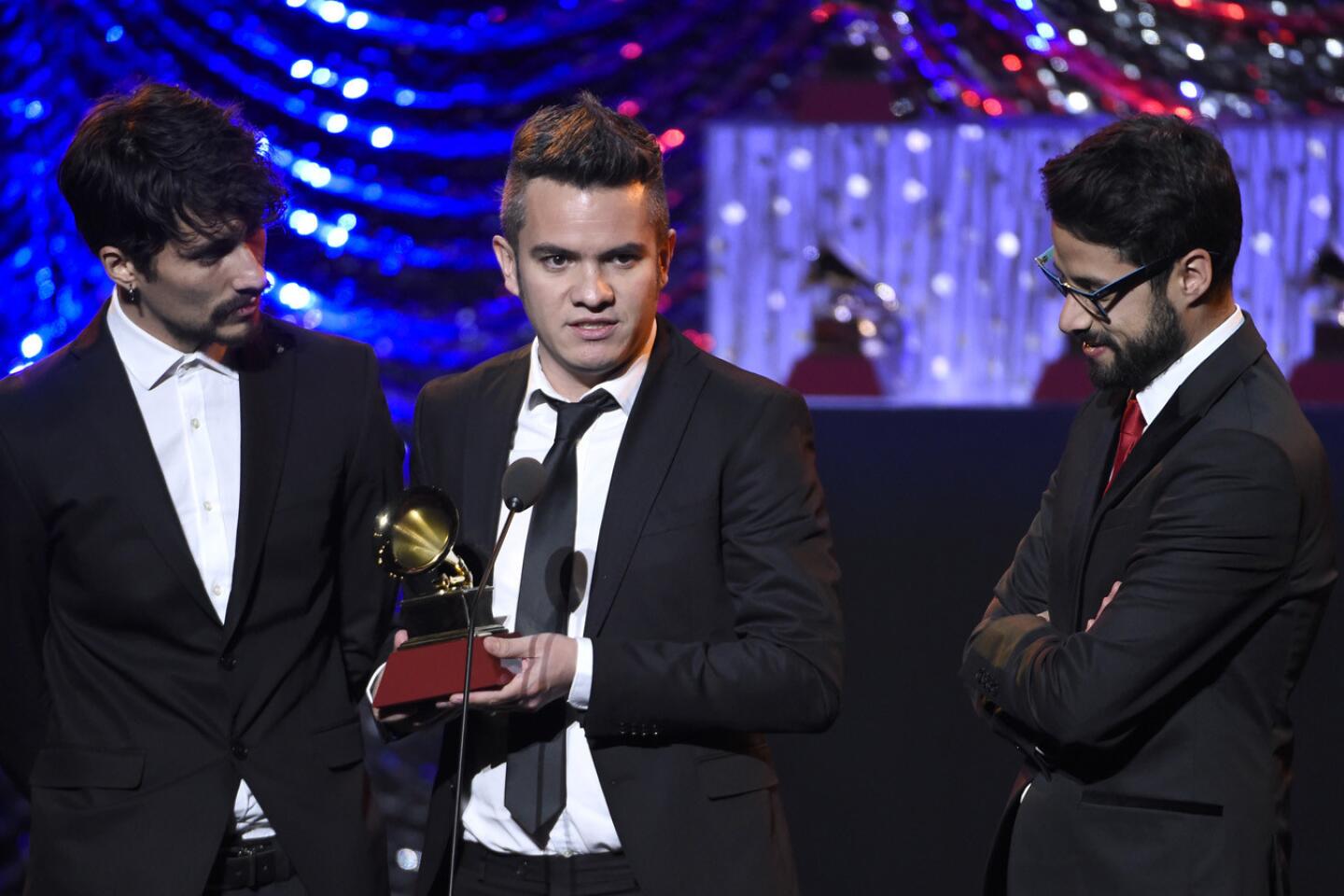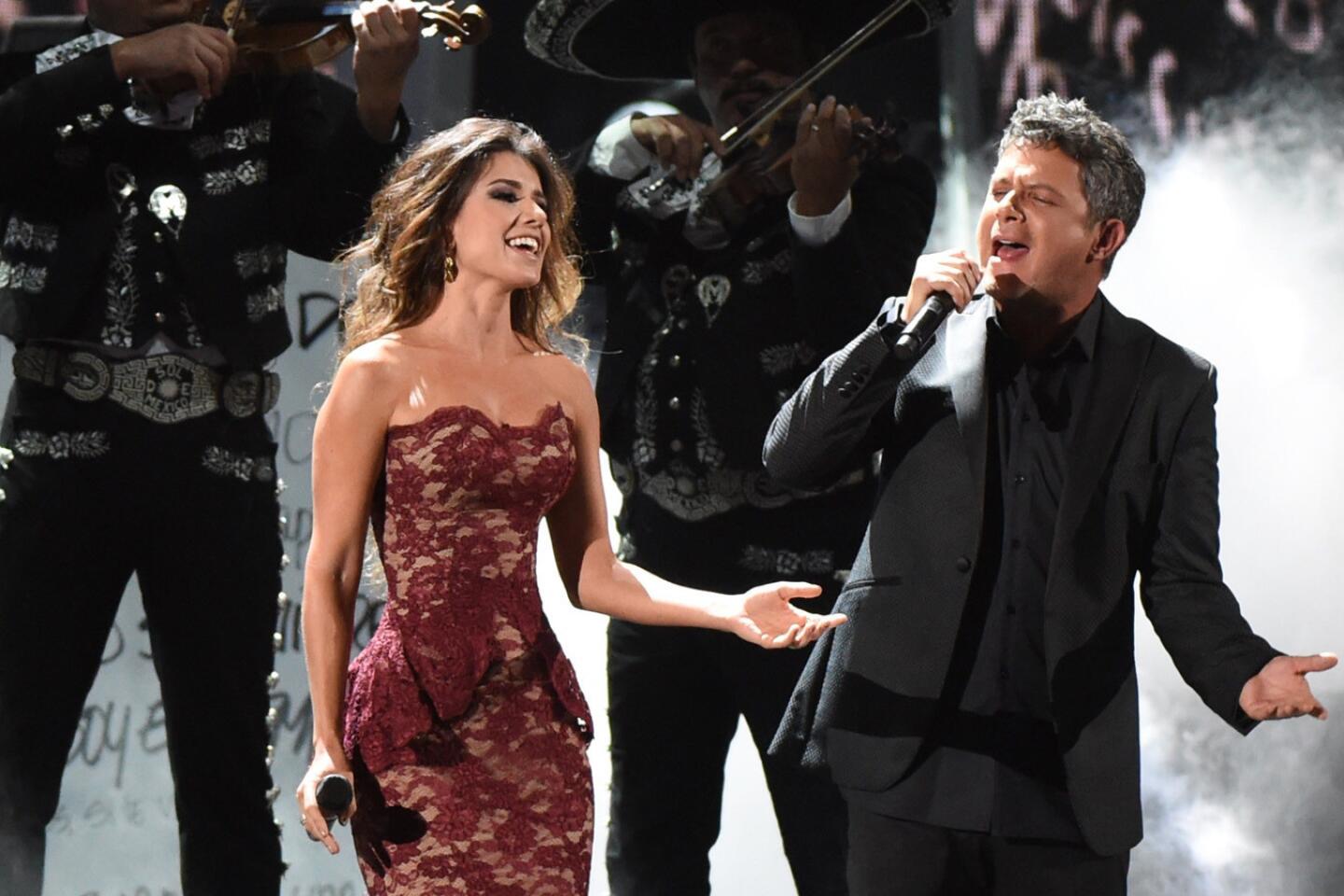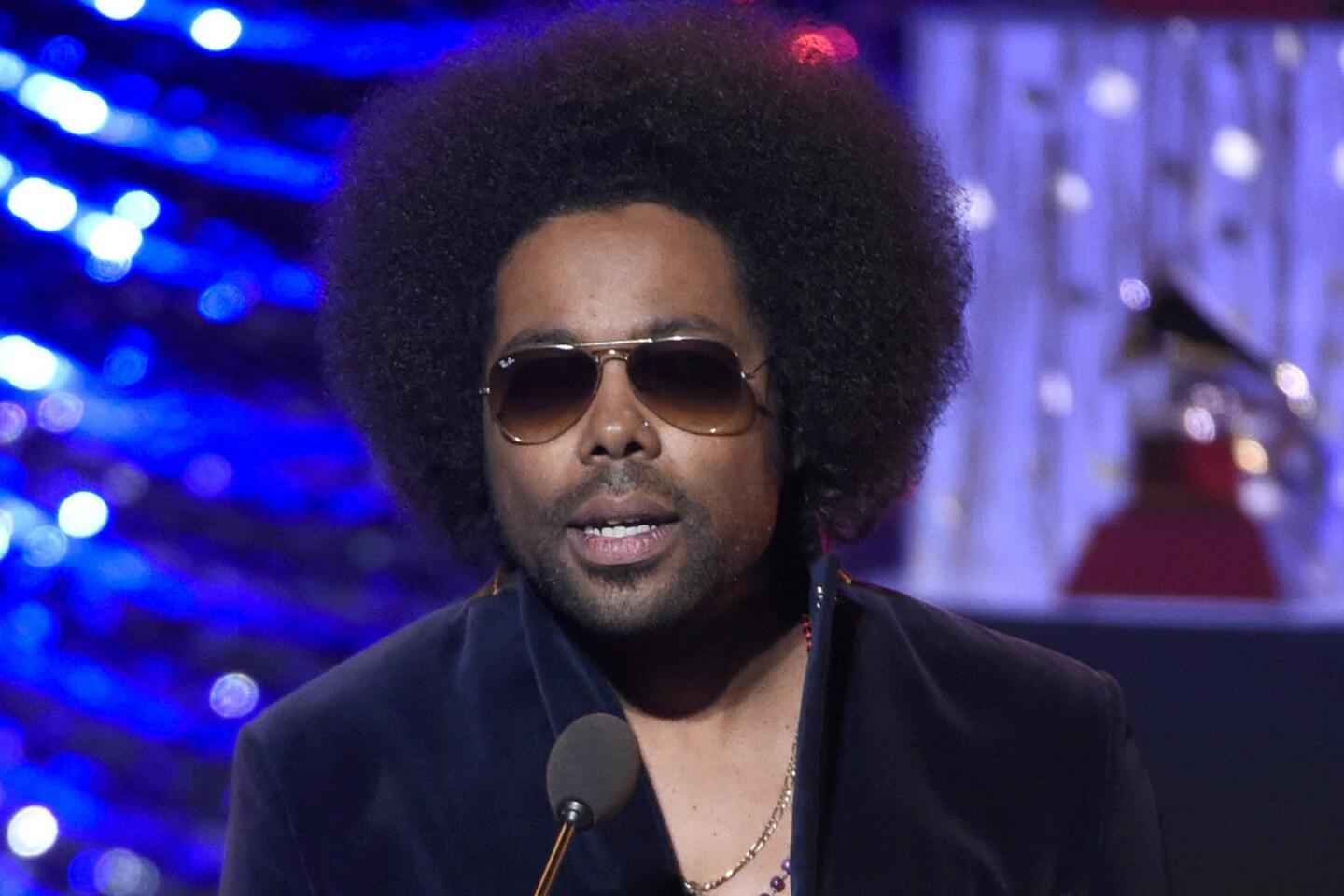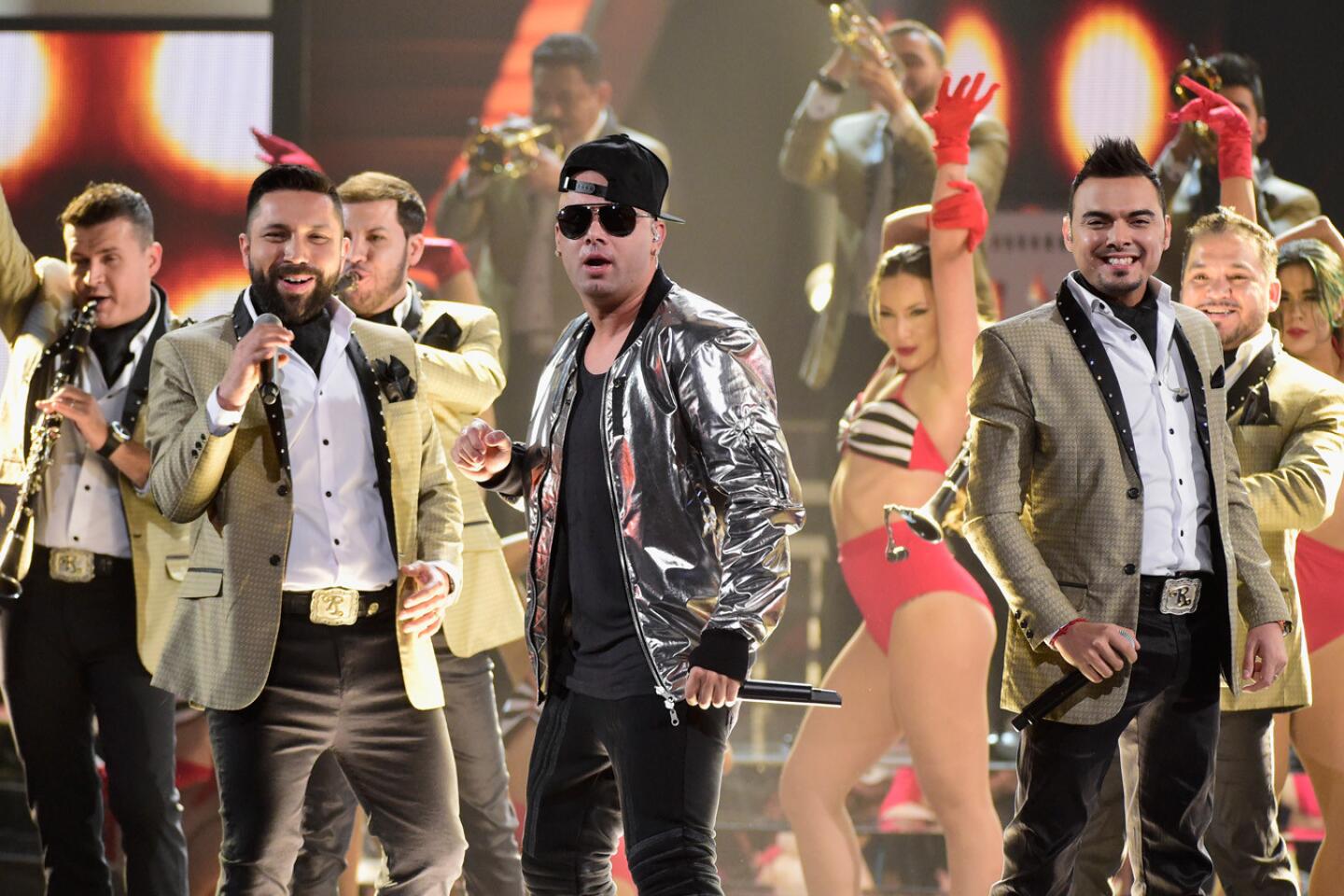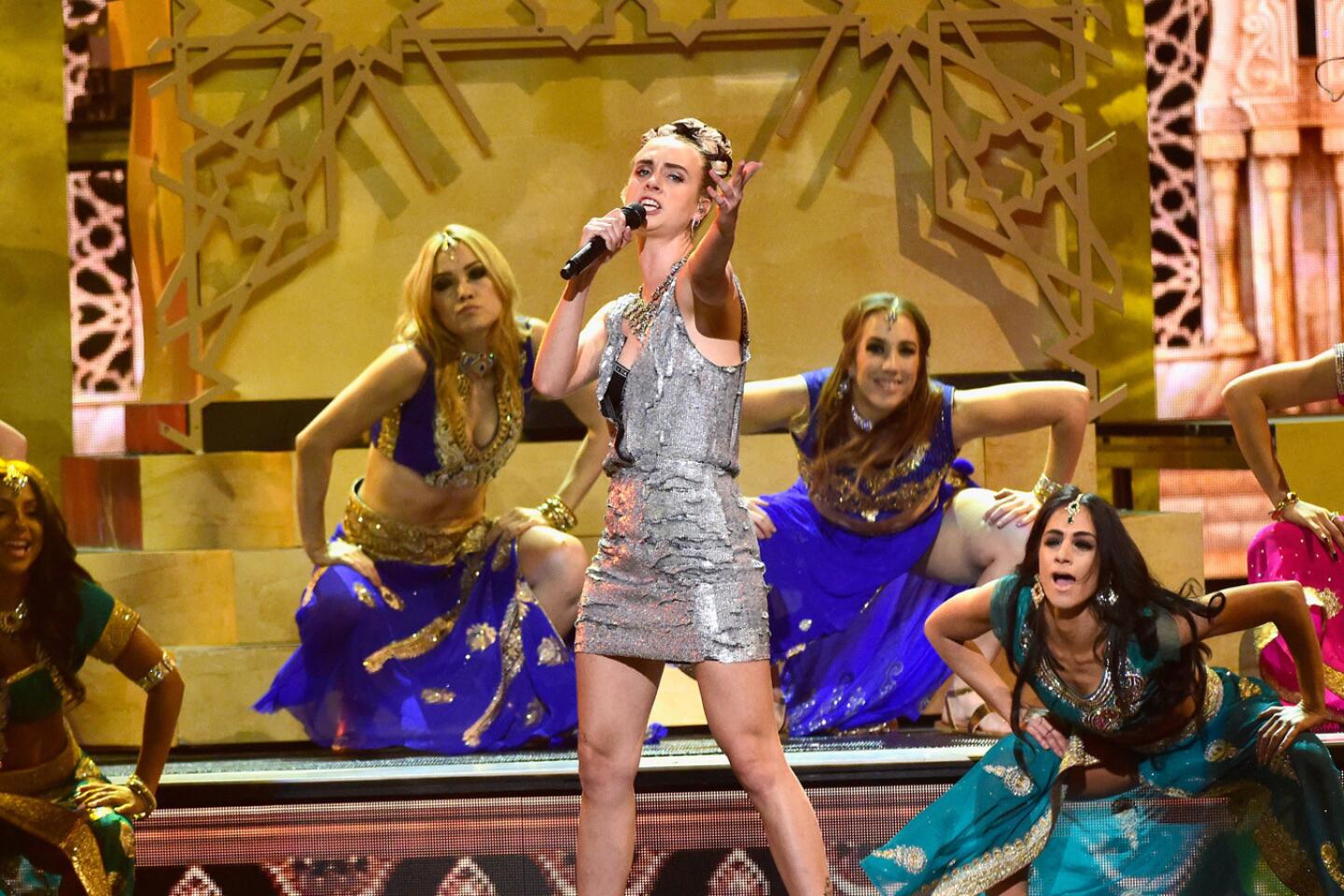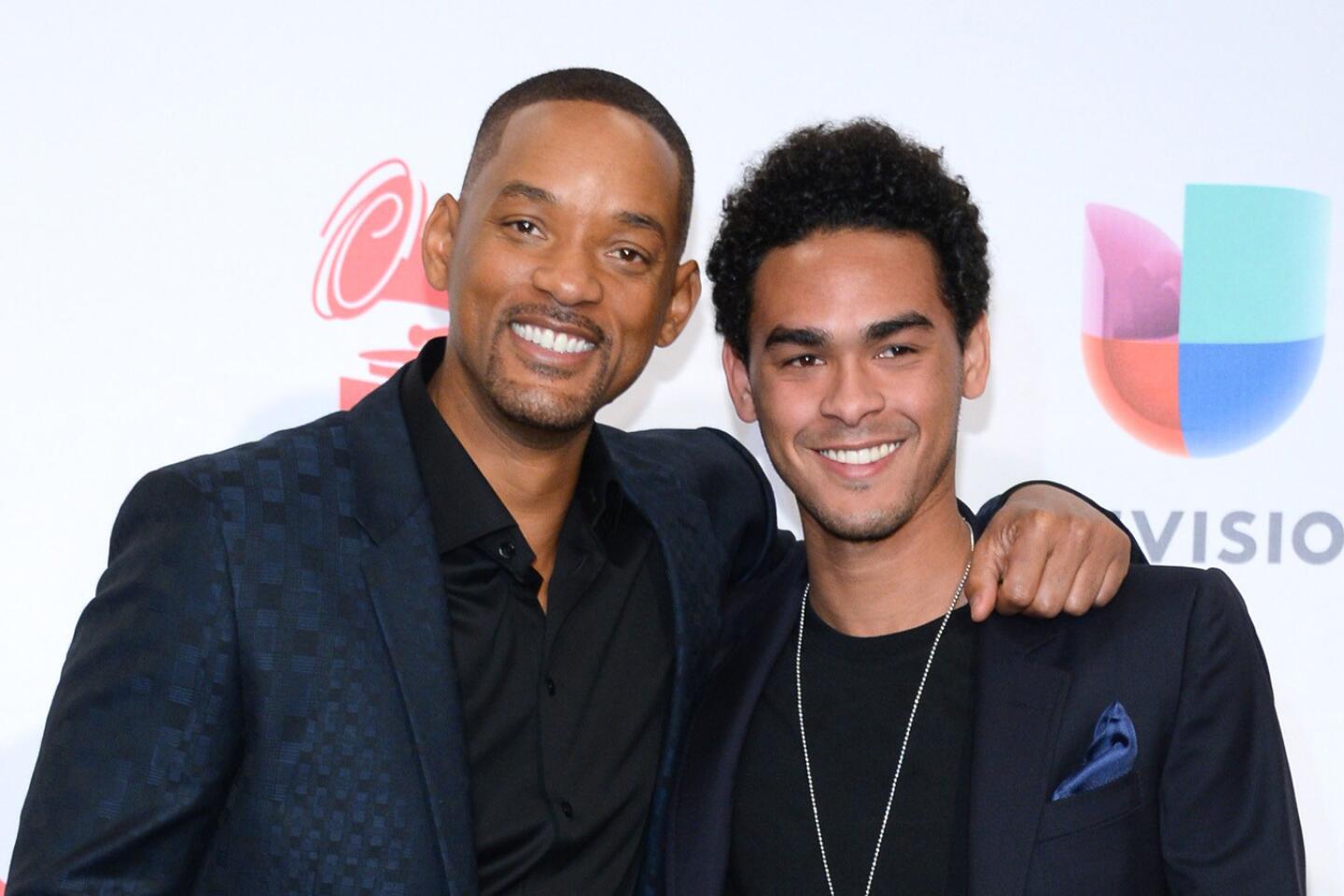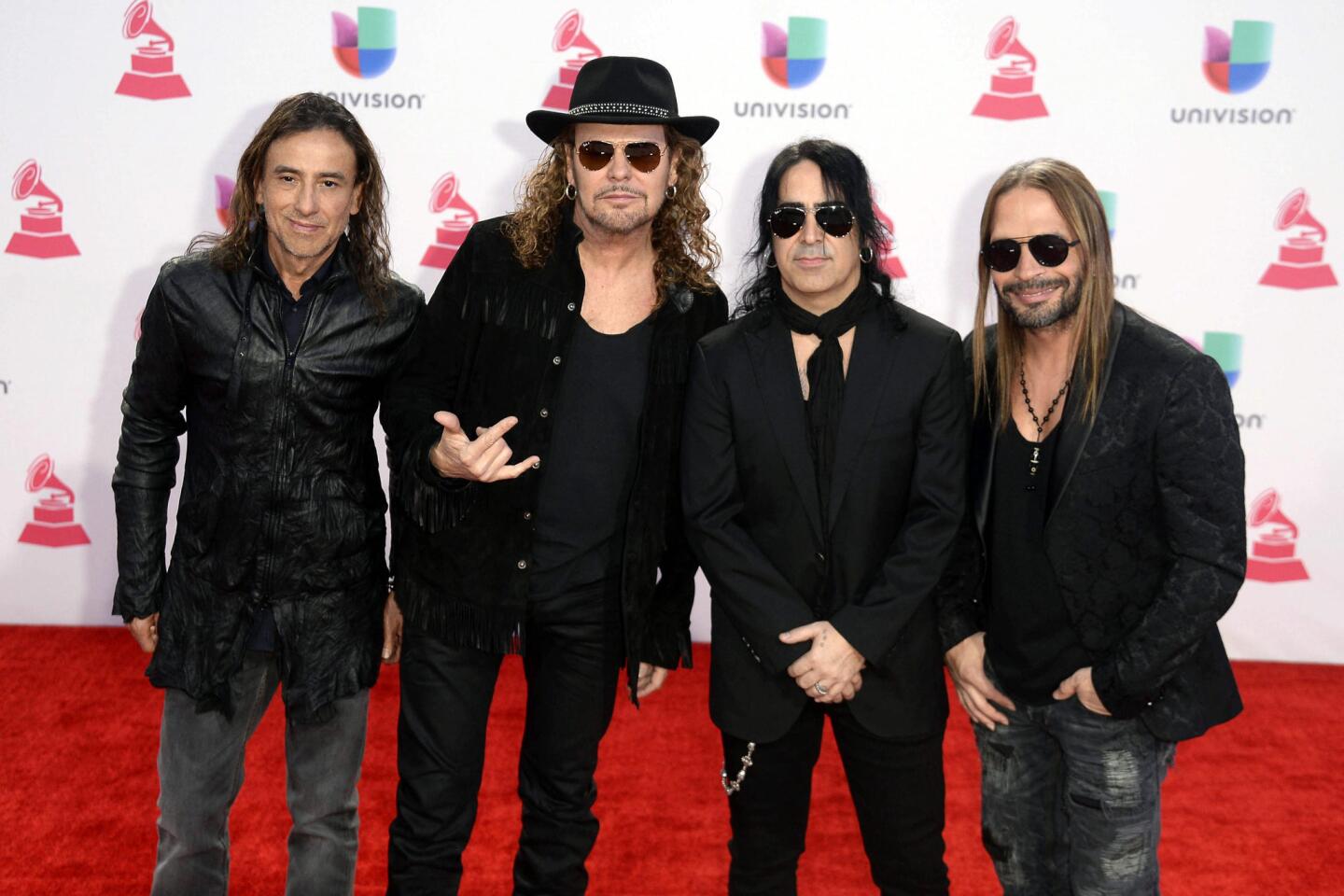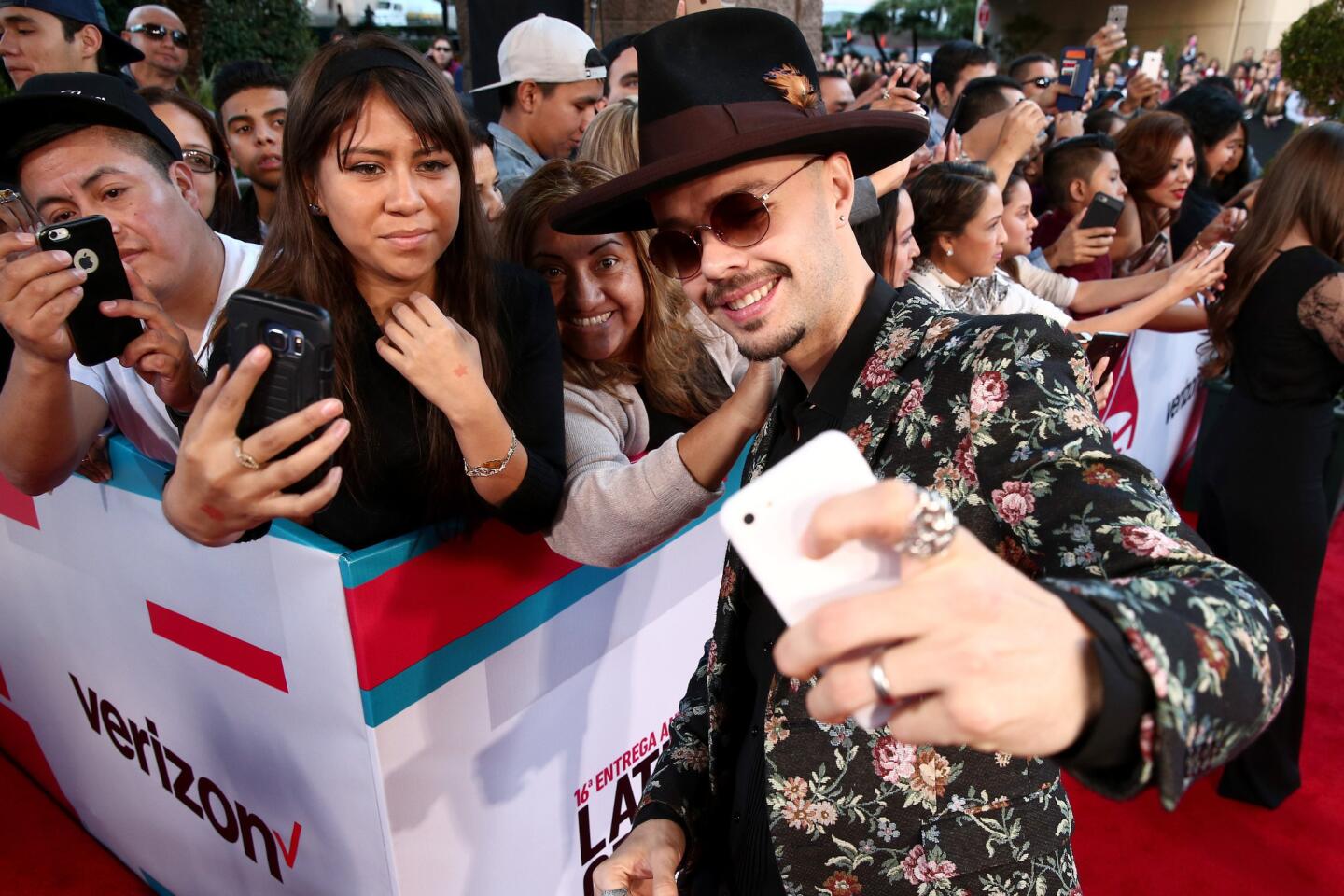Latin Grammy Awards: High political drama, reggaeton’s rise and Will Smith’s return to rap
- Share via
An hour and a half into the 16th annual Latin Grammy Awards, the ceremony was moving at a good clip. There were power ballads. There was smoke. There was cumbia and reggaeton. And there was Ricky Martin shaking his hips on “La Mordidita.”
Then Mexican rockers Maná took the stage with norteño legends Los Tigres del Norte. They sang the rousing immigrant anthem “Somos Más Americanos” (We Are More American), first recorded by Los Tigres in 2001, and covered by Maná on its recent album, “Cama Incendiada” (Burning Bed), which won the night’s Latin Grammy for pop/rock album.
SIGN UP for the free Essential Arts & Culture newsletter >>
“They already shouted at me a thousand times to go back to my country / Because I don’t belong here,” go the lyrics. “But I want to remind the gringo / I didn’t cross the border / The border crossed me.”
In choosing to play that particular song at Thursday’s media-saturated Latin Grammy Awards, which airs nationally to an audience of roughly 10 million people on the Univision Network, these two iconic Mexican bands from both sides of the border (Los Tigres live in California and a number of them are U.S. citizens) were deliberately pushing back against the negative portrayal of Mexican and other immigrants in the media — in particular, statements by conservative presidential candidate Donald Trump that labeled Mexicans criminals and “rapists.”
But the bands took things one step further: At the end of their song, which had the audience on its feet, they unfurled a banner that read, “Latinos Unidos No Voten Por Racistas,” or “Latinos United, Don’t Vote for Racists.” The audience exploded in applause. At that very moment, both bands announced a voter registration initiative on their respective social media feeds (SomosMas2016.com), injecting a strong dose of politics into a show that had been enjoyable, if generally devoid of hot topics.
“For those of us who can vote, often we take it for granted,” Tigres lead singer Jorge Hernandez told The Times via telephone soon after the bands came off stage. “So we are here to say, ‘If you can do it, think of those in need.’ ”
Maná lead singer Fher Olvera added over the phone, “We wanted to send a proactive message for Latinos — of which there are 50 million in the United States, in the No. 2 Spanish-speaking country in the world: Register, go out and vote, and vote for the candidate that will do positive things for Latinos.”
Describing the scene, Maná drummer Alex González said, “When Fher announced Los Tigres, everyone stood and it was explosive. People felt that Latino union. And then when we took out the sign, and everyone got even more excited. It was crazy.”
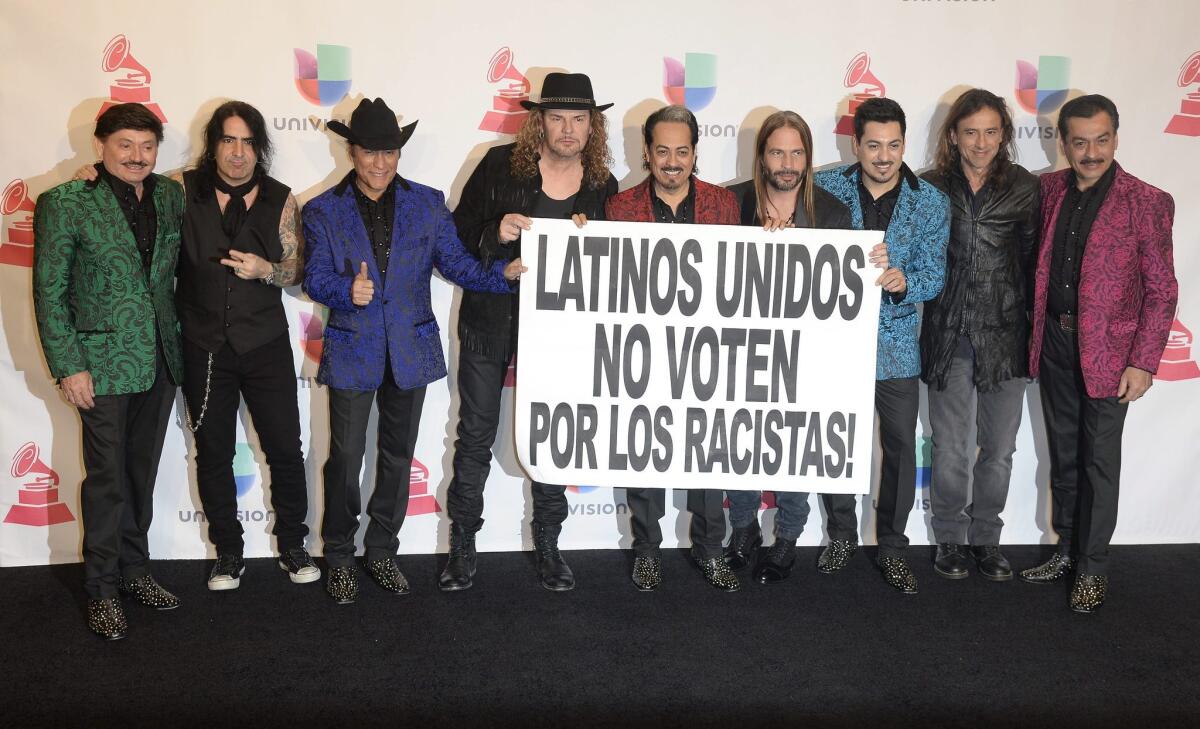
Mexican rock band Maná and norteño group Los Tigres Del Norte pose with the banner they held up during their performance at the Latin Grammy Awards: ‘Latinos United, Don’t Vote for Racists.’
It’s the not first time immigration politics have interrupted the awards. Last year, the show started 20 minutes late when Univision delayed the broadcast in order to show a speech on immigration policy by President Obama.
Had it not been for the political sign-hoisting, the show might have been better remembered as a night in which reggaeton came to rival pop as the bread and butter of the Latin Grammys — at least on stage, if not in the actual awards. (Most reggaeton musicians are still confined to various “urban” music categories, with pop and other musical styles dominating the prestigious areas like album of the year and record of the year.)
The show, held at Las Vegas’ MGM Grand Garden Arena, opened with a strong performance by Colombian reggaetonero J Balvin — who is inescapable on many Spanish-language radio stations — singing his hit song “Ginza,” a number about dancing reggaeton. He also played a duet with electronica group Major Lazer and MØ. (Balvin later won the trophy for urban song.)
This was followed by other reggaeton acts, either alone or as parts of medleys with other musicians: the Puerto Rican star Wisin jammed with Ricky Martin on their single “Que Se Sienta El Deseo” (Feel the Desire) and Nicky Jam sang his smash break-up single “El Perdón” (Forgiveness) — for which he took home the award for urban performance.
In an emotional speech, Jam thanked his parents and used his time to say a word about the situation in France. “I dedicate this to the people of Paris for what happened,” he said. “May god bless you.”
Jam also closed the telecast in a duet with Colombian vallenato singer Silvestre Dangond, with their song “Materialista,” a number rich in African drums.

Pop star Ricky Martin, left, and reggaeton star Wisin -- both of whom hail from Puerto Rico -- perform their song ‘Que Se Sienta El Deseo’ during the 16th Latin Grammy Awards.
Indeed, this was a night in which Colombian musicians dominated the stage — with Balvin opening the show and Dangond closing it out. In between, the jazz pop Colombian swing band Monsieur Periné took home the award for best new artist and hip-hop/reggaeton act ChocQuibTown performed with a Cuban dance troupe and took home the award for tropical fusion album for “El Mismo” (The Same One).
More significantly, the Colombian electronica duo Bomba Estéreo, which was nominated in two categories but didn’t win any awards, gave a thumping rendition of their exhilarating dance single “Fiesta” — with a guest appearance by Will Smith. It was the first time the actor and onetime rapper had taken to the musical stage in a decade. (He had previously appeared in the remix of the song.)
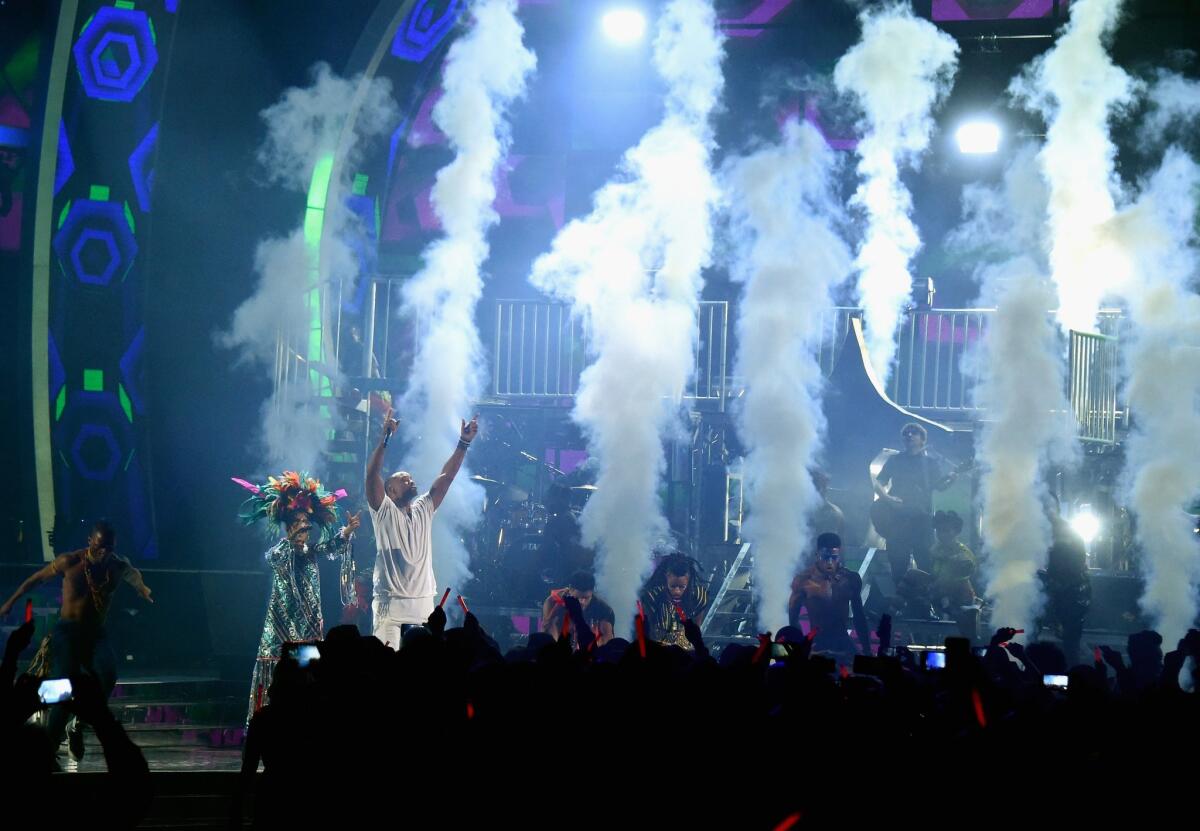
Liliana Saumet, of Bomba Estéreo, and Will Smith perform ‘Fiesta’ at the 16th annual Latin Grammy Awards. The ceremony represented a musical comeback for Smith -- and a strong showing for Colombian bands.
In fact, before the Latin Grammy Awards aired, the big talk of the show had been about Smith’s appearance. But coming minutes after Los Tigres and Maná held up their “Don’t Vote for Racists” sign on stage, Smith’s performance took a backseat to politics on social media, which exploded with talk about voting and immigration.
The night’s big award winner was a Mexican artist — but an unlikely one. This past spring, indie singer-songwriter Natalia Lafourcade released “Hasta La Raíz” (To the Root), a critically acclaimed album that has been popular in Mexico but has received a more muted response abroad. She nonetheless took home five trophies, including record of the year, song of the year and alternative music album. She also performed a stirring rendition of the album’s title song.
“Let’s conserve our roots,” she said during her acceptance speech for Song of the Year. “Let’s take care of our origins. It’s important that we conserve it, no matter how far we travel.”
Mexican indie balladeer Leonel García, who had gone into the awards ceremony with six nominations — for his own album “Amor Futuro” (Future Love), as well as for song writing on Lafourcade’s record — took home two Latin Grammys for his work on “Hasta La Raíz.”
Dominican merengue star Juan Luis Guerra, who also performed, took home three trophies for his album “Todo Tiene Su Hora” (Everything Has Its Time), which won the coveted album of the year.
Overall, it was a vastly improved show from years past. Mexican regional acts weren’t buried at the end of the show as they were last year — a good thing because Mexican regional music is hugely popular.
One of the best performances of the night came early on when the long-running Banda El Recodo played “Mi Vicio Más Grande” (My Biggest Vice) then segueding into an irresistible duet with reggaetonero Wisin for their song “Las Fresas” — about uppity rich girls. It’s the sort of tune that makes it difficult to sit still.
There were other excellent acts: former Shakira back-up singer Raquel Sofía wowed with her scratchy lovelorn girl anthem “Te Amo Idiota” (I Love You, Idiot), and Espinoza Paz engaged the audience with “Perdi La Pose” (I Lost the Post), a Mexican ranchera that brought a good dose of Latin American melancholy to the otherwise upbeat show.
Likewise, the career tribute to legendary Brazilian romance balladeer Roberto Carlos, the Latin Recording Academy’s Person of the Year, had everyone in the audience singing along to classics such as “Yo Te Propongo” (I Propose to You). The audience was so into it, I was surprised not to see any ladies undergarments launched onto the stage.

Brazilian balladeer Roberto Carlos -- who was honored as the Person of the Year by the Latin Recording Academy -- sang a medley of some of his best loved songs during the awards ceremony.
Where the academy and Univision blew it was airing the broadcast on tape delay on the West Coast, a decision that boggles the mind. Los Angeles is the No. 1 Latino market in the U.S. In the era of social media, it’s difficult to comprehend why the show’s organizers would choose to fracture their audience in this way.
By the time the West Coast sat down to watch the show, images of Los Tigres and Maná holding up their sign were already all over social media, as were GIFs of the Smith/Bomba Estéreo performance. In a time when few television programs are actual national events, it’s mystifying why the Latin Grammys would choose to turn a show that could bring a nation together into just a piece of everyday programming.
Too bad that just as the Latin Grammys appeared to be getting the formula right — a taut awards show with engaging performances — the programmers think it’s 1995 instead of 2015.
This is an expanded version of a story that was first published on Nov. 19.
carolina.miranda@latimes.com
Find me on Twitter @cmonstah.
ALSO:
How the zonkey got its stripes: Long before Instagram, Tijuana’s tourist donkeys were camera-ready
Studio Visit: Acamonchi on the Nortec moment and how Tijuana’s art scene extends to San Diego
Art in honor of the missing 43: the powerful symbols of the Ayotzinapa protests in Mexico
More to Read
The biggest entertainment stories
Get our big stories about Hollywood, film, television, music, arts, culture and more right in your inbox as soon as they publish.
You may occasionally receive promotional content from the Los Angeles Times.
